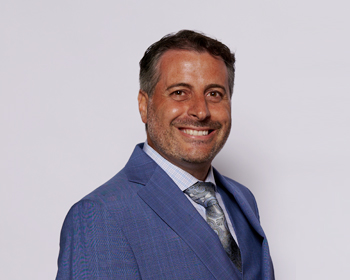Feature: Connecting for success
 By Cam Buchan
By Cam Buchan
Whether working in the family retail business or now as Associate Dean, Windsor Campus for the Schulich School of Medicine & Dentistry, Dr. Larry Jacobs is focused on connections.
Starting his fifth year in the role, Jacobs oversees approximately 150 medical students training in Windsor, as well as residents and faculty. It’s a growing portfolio that keeps him busy juggling hospital rounds, his own practice, and time at the Windsor Campus. As Jacobs describes it, “I can’t waste time. I sometimes need to do my administrative work after hours or in the elevator line, wherever I can be on my phone.”
Jacobs worked in his parents’ shoe store as a boy growing up in nearby Leamington, where he learned the importance of customer service. From there, he graduated from the University of Windsor with a Bachelor of Science in 2002 and Bachelor of Education in 2003, before earning an MD at Wayne State University School of Medicine. He completed his Internal Medicine residency training at the University of Toronto, joining Schulich Medicine & Dentistry in 2011.
Making connections and expanding the program in Windsor over the past four years have been highlights for Jacobs. He is also connecting with Wayne State and Henry Ford Hospital, both in Detroit Michigan, to continue to diversify students’ experiences.
A shared passion
The success of the Windsor Campus, which has been hosting full-time MD students since 2008, is due to a shared passion by the administration, staff, and faculty to make the program succeed. But it has come with challenges.
“There’s always been a desire to make this campus work, and that’s why it has been so successful,” said Jacobs, who credits an engaged faculty and exceptional clinical teaching for its progress.
One challenge has been to overcome the perceived inability of faculty to advance academically when they weren’t located in London. Jacobs has been working closely with the Dean’s Office at the School to ensure faculty can succeed in their academic endeavors in Windsor.
“I’m very happy to see where we are moving,” Jacobs said. “We have new faculty members who have entered full-time clinical academic roles. I feel we are nurturing and growing a new generation of people to take over and recognizing the immense work done by others to grow this campus.”
Ongoing education
“I learn new things in medicine every single day,” said Jacobs. “That doesn't mean that I didn't graduate competent. But it’s that meter inside that indicates that I need to pause and take stock of what I don’t know.”
Getting students and residents to know when to ask for help is important in helping them reach the next level. It means Jacobs and his team are always checking to ensure students are prepared for the future, and “not just checking the boxes and moving on.”
Jacobs has also distinguished himself on the educational side of the role. He has been recognized twice by learners with the Class of ’62 Award and Internal Medicine PGY3 – CTU Consultant Physician Awards in 2014 and 2016.
“I think that’s one of my highlights,” Jacobs said. “Being recognized at both the student and resident levels as someone who does a lot for them as an educator is so rewarding.”
Coming full circle
While planning for a new acute care facility in Windsor is underway, COVID-19 is taking a toll on the city and its residents, as well as administrators, nursing staff and faculty. However, Jacobs highlighted the partnership between the School and hospital during the pandemic.
“One of the great joys I’ve had is that, because we have such a great relationship with our hospital partners, our education never stopped,” he said. “And a lot of people doing so much of the pandemic work were graduates of the School or residents in the program. So, it was heartwarming to see it come full circle that way.”
Planning for the future requires investment in areas that are important. Jacobs praised the administrative support that has enabled him to fill two critical gaps at the School: a student counsellor shared with the Department of Nursing at the University of Windsor, who provides student support; and a Medical Student Research Associate, who supports students and faculty in developing and guiding their research projects.
“The School has always been supportive of things that matter, and these are things that matter.”








